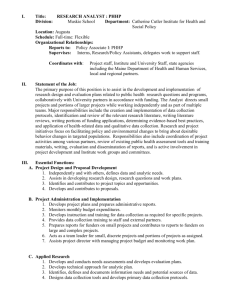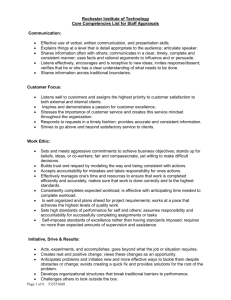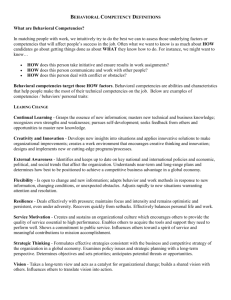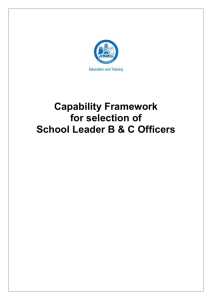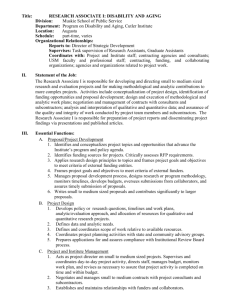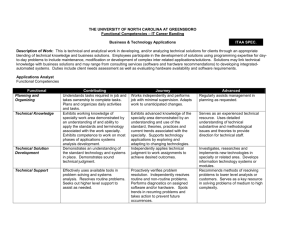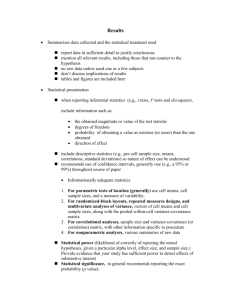core skilLS - British Council
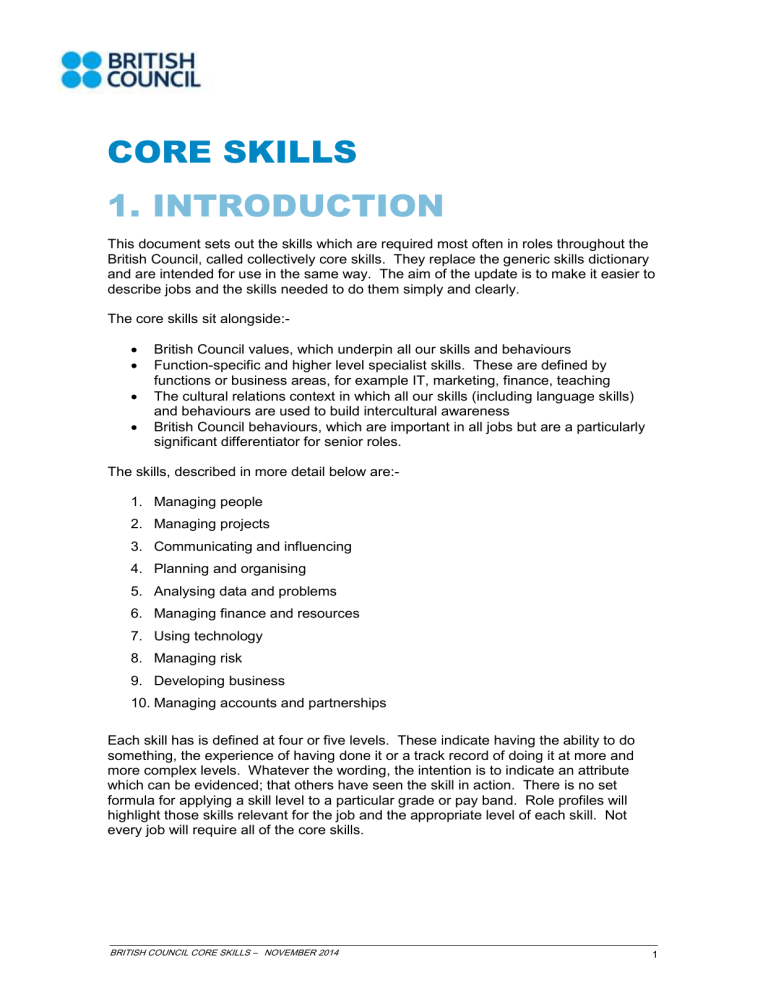
.
CORE SKILLS
1. INTRODUCTION
INTRODUCTION
and are intended for use in the same way. The aim of the update is to make it easier to describe jobs and the skills needed to do them simply and clearly.
The core skills sit alongside:-
British Council values, which underpin all our skills and behaviours
Function-specific and higher level specialist skills. These are defined by functions or business areas, for example IT, marketing, finance, teaching
The cultural relations context in which all our skills (including language skills) and behaviours are used to build intercultural awareness
British Council behaviours, which are important in all jobs but are a particularly significant differentiator for senior roles.
The skills, described in more detail below are:-
1. Managing people
2. Managing projects
3. Communicating and influencing
4. Planning and organising
5. Analysing data and problems
6. Managing finance and resources
7. Using technology
8. Managing risk
9. Developing business
10. Managing accounts and partnerships
Each skill has is defined at four or five levels. These indicate having the ability to do something, the experience of having done it or a track record of doing it at more and more complex levels. Whatever the wording, the intention is to indicate an attribute which can be evidenced; that others have seen the skill in action. There is no set formula for applying a skill level to a particular grade or pay band. Role profiles will highlight those skills relevant for the job and the appropriate level of each skill. Not every job will require all of the core skills.
BRITISH COUNCIL CORE SKILLS – NOVEMBER 2014
1
2. THE CORE SKILLS
1.
MANAGING PEOPLE
Level Definition
1
2
Supports others
Provides support to less experienced members of the team and is aware of individual differences. Helps colleagues perform tasks and use systems and processes.
Supervises a small team
Supervises a small team of people doing similar jobs to deliver short term tasks to agreed quality and time standards.
3
4
5
Manages a team
Provides full line management to a team where all members are working in a similar area of expertise or business. Scope includes planning, setting objectives, role modeling an inclusive culture, recruitment, development and performance management.
Leads a large and varied team
Manages a substantial group to deliver annual business objectives. The team includes different professions, cultures and/or areas of business, and may cover multiple locations.
Leads a major unit
Leads a major business unit or function, setting its structure and processes, defining future workforce requirements, promoting diversity in the workplace and reshaping the workforce to meet need.
2.
MANAGING PROJECTS
Level Definition
1
2
Follows project management disciplines
Works with project management systems and procedures, and has a track record of compliance with them as a project team member.
Analyses project data
Examines project data and performance, reporting on progress and recommending corrective action as needed.
3
4
5
Leads smaller projects
Analyses requirements with the sponsor/stakeholders, defining the specification, planning, revising, implementing and evaluating on small-tomedium scale and/or low risk projects.
Leads larger projects
As above for medium-to-large and/or high risk projects, coordinates a diverse team with awareness of equality and diversity impact as part of the project specifications and handles changes in specification or plan to meet unexpected circumstances
Assures project standards
Develops and ensures the implementation of high quality projects management disciplines across functions, teams and business areas.
British Council Core Skills – November 2014 2
3.
COMMUNICATING AND INFLUENCING
Level Definition
1
2
3
4
5
Communicates clearly & effectively
Listens to others and expresses self clearly, with grammatical accuracy and awareness of a diverse audience in speaking and writing.
Relates communications to circumstances
Displays good listening, writing and speaking skills, setting out logical arguments clearly and adapting language and form of communication to meet the needs of different people/audiences.
Is creative and adaptable in communications
Able to use a range of non-standard and creative approaches to inform, and persuade others, extending beyond logical argument to influence decisions and actions in a way which is inclusive and engaging.
Uses influencing techniques
Uses formal and informal negotiating and motivation techniques to influence others’ behaviour and persuade them to think and act differently, while respecting difference of view and culture.
Influences at the highest level
Influences and manages relationships at the highest levels to build mutual understanding, shapes perceptions of the British Council and creates positive change over the medium term.
4.
PLANNING AND ORGANISING
Level Definition
1
2
3
4
Is methodical
Able to plan own work over short timescales for routine or familiar tasks and processes.
Plans ahead
Organises own work over weeks and months, or plans ahead for others, taking account of priorities and the impact on other people.
Develops annual plans
Develops and reviews the implementation of annual plans for a work group or function, taking account of business and customer requirements and reconciling competing demands.
Plans for the longer term
Shapes forward plans for 3-5 years ahead for a major unit or multiple units, taking account of British Council strategy and the need to manage contingencies, risks and impact.
British Council Core Skills - November 2014 3
5.
ANALYSING DATA AND PROBLEMS
Level Definition
1
2
Is systematic
Breaks down problems into a list of tasks to be done and decides on appropriate action.
Uses data
Reviews available data and identifies cause and effect, and then chooses the best solution from a range of known alternatives.
3
4
Analyses patterns
Seeks out and examines a range of information to identify patterns, trends and options, to solve multifaceted and complex problems.
Solves complex problems
Able to apply or devise specialised concepts and methods of analysis – or commission them from others. Understands the output and uses the results to make clear and / or solve complex business, market or policy problems.
6.
MANAGING FINANCE AND RESOURCES
Level Definition
1
2
Uses resources efficiently
Uses resources efficiently in own role and complies with financial rules and procedures.
Uses financial systems and processes
Uses corporate financial systems and processes appropriately as part of the job and on behalf of a team.
3
4
5
Supports budget management
Monitors and controls an agreed budget within a defined area, producing reports and analyses and contributing to planning.
Plans and deploys resources
Negotiates and agrees the resources for a defined area as part of forward planning, monitoring progress and adjusting resources or priorities to meet goals.
Evaluates performance
Evaluates resource allocation and use over time, to understand business and service performance and assess future opportunities and constraints.
British Council Core Skills - November 2014
BRITISH COUNCIL CORE SKILLS – NOVEMBER 2014
4
4
7.
USING TECHNOLOGY
Level Definition
1 Operates as a basic user of information systems, digital and office technology
2
Able, with adjustments if necessary, to use office software and British Council systems to do the job and manage documents or processes.
Operates as an advanced user
Works as an advanced practitioner in the use of office software and/or British
Council standard and social media platforms and trains or coaches others in their use.
3
4
5
Identifies improvements
Identifies where new or improved technology could benefit business efficiency, the customer experience or market opportunities and makes evidence-based recommendations.
Manages programmes
Commissions and successfully implements specialist technological or digital support to meet defined business or programme objectives.
Shapes investment
Defines future technology/digital system needs for a major area of business activity and translate them into design and implementation.
8.
MANAGING RISK
Level Definition
1
2
Follows good practices
Demonstrates understanding of risk management policies and procedures and record of following them.
Supports a risk management culture
Has track record of identifying and highlighting risks and suggesting
3
4 mitigating actions.
Develops the culture
Has track record of analysing potential risks, promoting risk awareness, and holding others to account for their practices.
Exemplifies strategic risk management
Has track record of balancing and mitigating risks in strategic and business plans and of providing a clear model of best practice to the business area/function.
British Council Core skills - November 2014 5
9.
DEVELOPING BUSINESS
Level Definition
1
2
Reviews data
Applies a range of standard analytical techniques to support business development
– e.g. pricing tools, revenue tracking, monitoring sales prospects, audience figures or profit margin.
Analyses trends
Researches markets and conducts cost/benefit analyses to identify new opportunities or recommend improvements to current initiatives.
3
4
5
Develops viable business
Defines and develops products/programmes/services which deliver British
Council goals on impact, income and surplus within a defined area of business that responds to market opportunities and aligns to wider corporate strategies.
Leads business development
Able to plan and deliver business development activities for a major and/or new market category which is significant for the Council.
Shapes business and market development
Uses a range of market analysis, research and business intelligence to develop and implement across a group of diverse products/programmes/services and markets to meet Council objectives.
10.
MANAGING ACCOUNTS AND PARTNERSHIPS
Level Definition
1
2
Supports account management
Able to research business issues and contacts in stakeholder and potential partner organisations to support account management and business development.
Works with stakeholders and partners
Communicates regularly with diverse stakeholders, customers and/or partners to build mutual understanding and trust.
3
4
5
Builds account teams
Identifies and deploys teams of Council staff whose attributes match the stakeholder/customer/partner’s needs, and adapting proposals to accommodate the needs of the other party.
Plans and leads on accounts and partnerships
Develops and leads on the delivery of account management and development plans across a range of stakeholders/customers/partners to deliver medium term business and/or reputational gains for both parties.
Shapes strategic relationships
Sets overall direction for the formation and management of strategic relationships, collaborations and contracts with stakeholder, customers and partners in a significant market.
